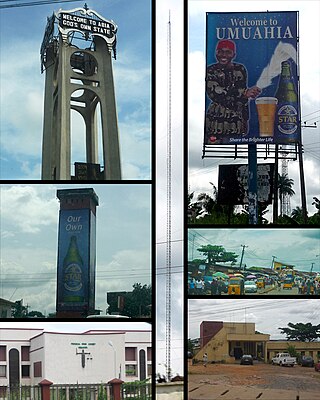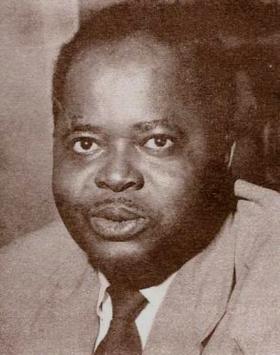
Abia State is a state in the South-East geopolitical zone of Nigeria, it is bordered to the north and northeast by the states of Enugu, and Ebonyi, Imo State to the west, Cross River State to the east, Akwa Ibom State to the southeast, and Rivers State to the south. It takes its name from the acronym for four of the state's most populated regions: Aba, Bende, Isuikwuato, and Afikpo. The state capital is Umuahia while the largest city and commercial centre is Aba.

Owerri is the capital city of Imo State in Nigeria, set in the heart of Igboland. It is also the state's largest city, followed by Orlu, Okigwe and Ohaji/Egbema. Owerri consists of three Local Government Areas including Owerri Municipal, Owerri North and Owerri West, it has an estimated population of about 1,401,873 as of 2016 and is approximately 100 square kilometres (40 sq mi) in area. Owerri is bordered by the Otamiri River to the east and the Nworie River to the south. The Owerri Slogan is Heartland.

Aba is a city in the southeast of Nigeria and the commercial center of Abia State. Upon the creation of Abia state in 1991, Aba was divided into two local government areas; Aba South and Aba North. Aba South is the main city centre of Abia State, south-east Nigeria. It is located on the Aba River. Aba is made up of many villages such as; Aba-Ukwu, Eziukwu-Aba, Obuda-Aba, Umuokpoji-Aba and other villages from Ohazu merged due to administrative convenience. Aba was established by the Ngwa clan of Igbo people of Nigeria as a market town and then later a military post was placed there by the British colonial administration in 1901. It lies along the west bank of the Aba River, and is at the intersection of roads leading to Port Harcourt, Owerri, Umuahia, Ikot Ekpene, and Ikot-Abasi. The city became a collecting point for agricultural products following the British made railway running through it to Port Harcourt. Aba is a major urban settlement and commercial centre in a region that is surrounded by small villages and towns. The indigenous people of Aba are the Ngwa. Aba is well known for its craftsmen and also the most populous city in the South Eastern Nigeria. As of 2016, Aba had an estimated population of 2,534,265. The state's slogan is "God's own State".

Umuahia is the capital city of Abia State in southeastern Nigeria. Umuahia is located along the rail road that lies between Port Harcourt to its south,and Enugu city to its north. Umuahia has a population of 359,230 according to the 2006 Nigerian census. Umuahia is indigenously Igbo.

Michael Iheonukara Okpara was a Nigerian politician and Premier of Eastern Nigeria during the First Republic, from 1959 to 1966. At 39, he was the nation's youngest Premier. He was a strong advocate of what he called "pragmatic socialism" and believed that agricultural reform was crucial to the ultimate success of Nigeria.
Nsirimo is a large community of about 5,000 people situated in Ubakala, Umuahia South Local Government in Abia state, Nigeria. It comprises autonomous community .Umumba is a community consisting of the Ibeku tribe and some other smaller tribes. It is bordered with Umuako in the west and Ubakala in the south. Its major market is Oreama market which is in the north. Umumba is not to far from Apumiri the Headquarters of Umuahia South Local Government Area.
Nnarambia is a town in Ahiara, Imo state, Nigeria. It is made up of five hamlets: Ama-obu, Amakpaka, Umuezereugwu, Umunnachi, and Ofor na Obia.
The Ohuhu clan of Umuahia north in Abia State Nigeria Igbo people, also referred to as Ohonhaw, form a unique community of people in Umuahia, Abia state, Nigeria, consisting of several Autonomous Communities including Umukabia, Ohiya, Isingwu, Ofeme, Afugiri, Nkwoegwu, Umuawa, Umudiawa, Akpahia, Umuagu, Amaogugu, Umule-Eke-Okwuru, Umuhu-Okigha, Amaogwugwu called Eziama/ Amaudo in Ohuhu etc. Ohuhu was formerly known as Umuhu-na-Okaiuga, or better-known as Ohu-ahia-na-otu. Until 1949, the Umuopara clan used to be part of Ohuhu before they were carved out politically.
Igbo culture are the customs, practices and traditions of the Igbo people of southeastern Nigeria. It consists of ancient practices as well as new concepts added into the Igbo culture either by cultural evolution or by outside influence. These customs and traditions include the Igbo people's visual art, music and dance forms, as well as their attire, cuisine and language dialects. Because of their various subgroups, the variety of their culture is heightened further.
Amaozara is a village located in Bende Local Government Area in Abia State, Nigeria. It is made up of four compounds: Ezi Ukwu, Ezi Egwu, Ezi Okoro and Ezi Uhu.
Ikwuano is a Local Government Area of Abia State, Nigeria. Its headquarters is in Isiala Oboro. The name 'Ikwuano' etymologically indicates that there are four different ancient kingdoms that make up the community called Ikwuano. These include Oboro, Ibere, Ariam/Usaka and Oloko.

Isiala-Ngwa South is a Local Government Area of Abia State, Nigeria. Its headquarters are in the town of Omoba.
Osisioma Ngwa is a Local Government Area of Abia state of Nigeria. Its headquarters are located in Osisioma town.
Umuopara are a clan of the Igbo people of Umuahia Nigeria Which is one of the five Clans that make up the present day Umuahia. Umuopara lies on the western border of Abia with Imo State. The natural boundaries between the Umuopara of Umuahia Abia State and its Umungwa and Udo-Mbaise neighbours both in Imo state is the Imo River.
Elemaga is a small farming village in Ibere, Ikwuano, Abia State, Nigeria. Elemaga is located in the center of Inyila, Isiala-Ibere, Ahia Orie, Iberenta, Inyila, Itunta and Obuoru the food belt of Ibere, about 15 km southwest of Umuahia, the Abia state capital. Elemaga is believed to be derived syntactically from the words Ele ("look"), Ma ("well") and Ga ("go") which literally means "look well before you go". Climate is tropical monsoon.
Omuma town is the headquarters of Oru East local government area of Imo State in the Southeastern part of Nigeria. It is one of the oldest towns in Imo State. Omuma is located at latitude 5.560° N and longitude 6.972° E. Its boundary to the west is Mgbidi, to the east by Akatta and Attah, to the north by Eleh and Nempi and to the south by Amiri and Otulu. Omuma has four communities: Abia-Omuma, Ozuh-Omuma, Umuhu-Omuma, and Etiti-Omuma. The current Imo state governor, Hope Uzodinma, is from Omuma.
Ndoro is a town in Oboro, Ikwuano Local Government Area of Abia State, Nigeria. It is about 16 km southeast from the state capital, Umuahia and is located along the Umuahia-Ikot Ekpene Road.
Ibere is a clan located in the eastern part of Ikwuano Local Government Area, Abia State, Nigeria. It borders Oboro to the west, Bende to the north, the Isuogu to the south, Itumbauzo and Nkari to the east. It is one of 18 Igbo clans of the Old Bende Division. Ibere was classified in the Ohuhu-Ngwa cluster of the Southern Igbo area by Forde and Jones.
Nnono is a village in Oboro, Ikwuano Local Government Area in Abia State, Nigeria. Nnono has common boundaries with Amaoba, Umugbalu, Ndoro, Ahuwa, Olokoro and Ngwa. Nnono consists of two autonomous communities and six sub-villages.
Ariam/Usaka is one of the four principal clans of Ikwuano Local Government Area, Abia State, Nigeria. Ariam/Usaka belongs to the Isuogu family. Ariam itself is made up of three subgroups namely; Ariam, Ekpiri and Usaka. This clan borders Ibere and Oboro to the north, Oloko to the west, as well as several Ibibio communities in Akwa Ibom State to its eastern and southern borders. Forde and Jones categorized the Isuogu family in the Ohuhu-Ngwa cluster of the Southern Igbo area.





